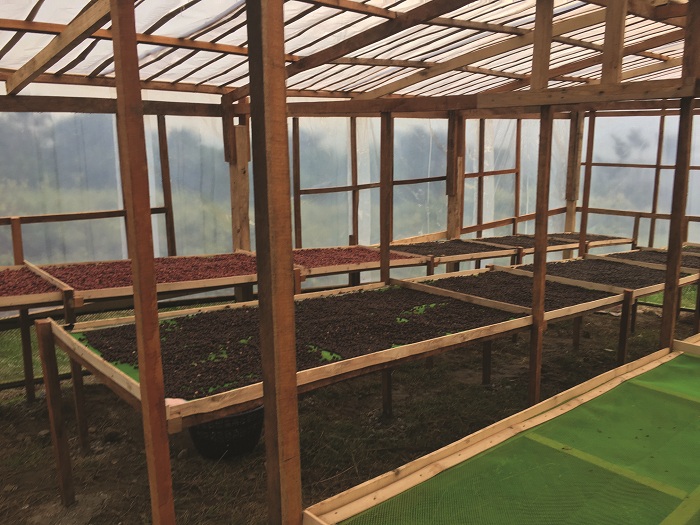Karen Blixen is one of literature’s more famous coffee farmers, having managed an estate in Africa and writing about her life there under the pseudonym Isak Dinesen. Indeed—in the era leading up to coffee’s ascent as a valued commodity—while many men may have had their names and faces documented for all to see, women have made their quiet contributions too. In the Philippines, which had its heyday as a major coffee producer, the women whose fortune were made with the bean flaunted their wealth by dressing well and announcing their affluence and accessories.
Today, there are Filipinas who are equally passionate (if not more so) about coffee farming as their male counterparts and businesses have spring up to support micro-farming or single-source beans. Ask a very good third wave barista in Manila about the provenance of the beans, and they can tell you about the farm it came from, who grew it, and the terroir. Frequent networking, aided by the internet, helps in establishing better ties locally and globally.
A MAGICAL BREW
One gem of an example is Cocotos Estate, a two-hectare farm managed by Dianne Pe at Mt. Apo in Davao. Located at the site of an active volcano and the highest mountain peak in the country, the combination of elevation plus volcanic soil certainly worked its magic, as devotees of Cocotos’ Arabica beans swear that it yields sweet brew, even when taken black.

Dianne’s technical explanation for the magical brew? “Luckily, our coffee is grown in an area with a unique balance of cool nights, dry sunny days, and well-distributed rainfall. It’s grown on fertile volcanic soil of the country’s highest mountain, Mt. Apo, at a frost-free elevation of 1,230 meters above sea level—all of which enable our Arabica (Catimor and Typica) coffee trees that we have to bear and produce such distinct and flavorful cups of coffee,” she says.
Dianne confesses that prior to Cocotos, she was partial to an iced coffee beverage from a popular coffee chain. She exclaims: “And that coffee makes my head ache when I drink it!” In any case, Dianne’s corporate marketing background made her inclined toward conceptualizing products and experiences. This, in turn, presented her with the opportunity to help two friend—lawyers who loved coffee so much that they had a two-hectare coffee farm in Davao. The married couple needed her to do marketing and product development and—despite Dianne’s then-zero knowledge of Specialty, Third Wave or Single Origin coffee—then bravely set forth because the product was originally just intended to be given as gifts and personal consumption.
LESSONS FROM THE COFFEE FARM
One lesson that Dianne and her friends learned from a blunder was from their very first roasting. “(It was) from the Manila cargo,” Dianne recalls. “We sent the sacks of coffee beans straight to a large batch roaster. Yes, we had them roasted even without checking the beans and knowing about its defects!” But they learned quickly from the feedback they received. As such, they improved their crop and were eventually encouraged to start selling.

We’re still learning and trying to experiment with other natural and organic practices, too! It’s quite challenging to learn about the agricultural side of coffee, but it’s a challenge definitely worth our time and effort, in the pursuit of growing only the best coffee that our farm can produce,” Dianne proudly states.
With their frequent participation and collaboration in activities hosted by government and private entities. Cocotos’ reputation grew. Dianne cites the first Coffee Summit in Davao, as well as doing their small batch roasting with EDSA Beverage Design Group (BDG), as vital in building the brand. In fact, it was during the first roasting at EDSA BDG that the Department of Agriculture’s undersecretary Berna Romulo-Puyat enjoyed the beans at a blind coffee cupping. She later brought it into the first Madrid Fusion Manila.
Dianne’s enthusiasm for her product seems to have grown along with the challenges. She adds: “My exposure to coffee had led me to much appreciation on farming in general. Before it just seemed simple, where theoretically you just plant any seed and it will grow. But then having been on an actual farm, it doesn’t seem to be that easy. We’re still ‘rookies’ in this coffee industry. We’re constantly learning and discovering ways on how we can improve and streamline farming and processing, while maintaining quality at the core of our efforts.”
Dianne and her partners also started an extension program called Cocotos Connects, allowing them to bring more Mt. Apo single origin coffee from neighboring farms to the attention of aficionados. And speaking of extensions, the farm is expecting another three hectares of land to plant more coffees on.

Asked to comment on the role of women in coffee farming, Dianne states, “I see it simply as an opportunity for me to explore how I can improve myself and do the best that I can with what I love doing, and ultimately make a meaningful impact through my work.”
Since her foray into Cocotos Estate, Dianne now prefers black coffee, with the occasional dabbling of a cappuccino or latte. She says, “When it comes to gender in working with coffee, it should not be surprising anymore if women are to be involved and working with coffee at the farm level. There may be challenges along the way, especially since people are just used to dealing with the men throughout the coffee chain. For me, I don’t see my gender as a barrier to be able to make a difference in the world of coffee.”
Spoken like a woman who found purpose and passion through the bean.
